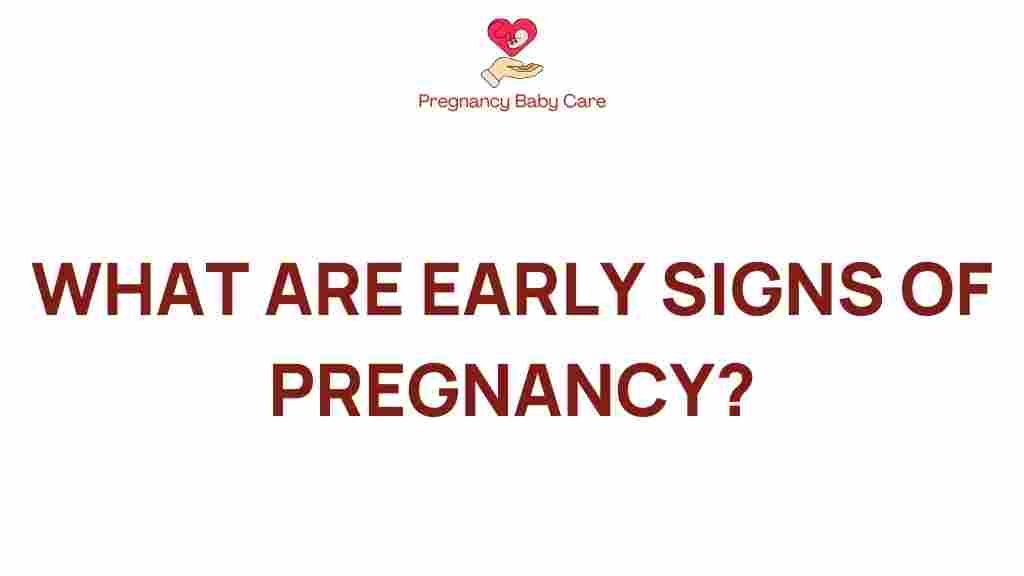Unveiling the Hidden Clues: Early Signs of Pregnancy You Should Know
Understanding the early signs of pregnancy is crucial for anyone trying to conceive or even those who might suspect they could be pregnant. Awareness of these signs can lead to timely confirmation and prenatal care, which is important for the health of both the mother and the baby. In this article, we will explore the various pregnancy symptoms that can signal the beginning of a new journey, from hormonal changes to the more obvious missed period.
What to Look For: Early Signs of Pregnancy
There are several early signs of pregnancy that may appear as soon as a few weeks after conception. While these symptoms can vary from woman to woman, being aware of them can help you identify if it’s time to take a home pregnancy test. Here are some common early signs:
- Missed Period: One of the most significant early signs is a missed menstrual period. If your cycle is regular and you suddenly miss a period, it could be a strong indication of pregnancy.
- Nausea: Often referred to as “morning sickness,” nausea can start as early as two weeks after conception. It can occur at any time of day and may be accompanied by vomiting.
- Fatigue: Many women report feeling unusually tired or fatigued during the early stages of pregnancy due to hormonal changes in their bodies.
- Breast Tenderness: Hormonal fluctuations can cause breasts to feel tender, swollen, or sore. This symptom can be similar to what some women experience before their period.
- Mood Swings: The surge in hormones can lead to mood swings, making you feel more emotional or irritable than usual.
Understanding Hormonal Changes
Pregnancy triggers a cascade of hormonal changes in a woman’s body. The most notable hormones involved include:
- Human Chorionic Gonadotropin (hCG): This hormone is produced shortly after the fertilized egg attaches to the uterus. It is the hormone detected in most pregnancy tests.
- Progesterone: Levels of progesterone increase significantly during pregnancy, helping to maintain the pregnancy and preparing the body for breastfeeding.
- Estrogen: This hormone helps in the growth of the uterus and the development of the fetus.
These hormonal shifts can lead to the various pregnancy symptoms mentioned above. If you notice these signs, it may be time to take a home pregnancy test to confirm your suspicions.
Taking a Home Pregnancy Test
Home pregnancy tests are a convenient way to check for pregnancy. Here’s a simple step-by-step process for using a home pregnancy test:
- Choose the Right Test: Select a reliable brand and check the expiration date.
- Read the Instructions: Each test may have slightly different instructions, so read them carefully.
- Collect Your Sample: Most tests require urine. You can either urinate directly on the test stick or collect urine in a cup and dip the test stick.
- Wait for Results: After applying your sample, wait for the recommended time (usually 3-5 minutes) before checking the results.
- Confirm Results: A positive result typically shows two lines or a specific symbol. If negative and your period still doesn’t arrive, consider retesting in a few days.
For more detailed information on how to interpret your results, you can visit this helpful resource.
What If You Get a Negative Result?
It’s important to note that sometimes, even if you are experiencing the early signs of pregnancy, a home pregnancy test may yield a negative result. This could be due to several factors:
- Testing Too Early: If you take the test before your missed period, the hormone levels may not be high enough to detect.
- Incorrect Usage: Not following the instructions accurately can lead to inaccurate results.
- Low hCG Levels: Some women may have lower levels of hCG, which can affect test accuracy.
If you suspect you’re pregnant despite a negative result, wait a few days and try again. If you continue to have symptoms, consider consulting a healthcare provider.
When to See a Doctor
If you confirm your pregnancy or if you are experiencing any concerning symptoms, it’s essential to seek professional medical advice. Here are some signs that warrant a visit to your doctor:
- Severe abdominal pain or cramping
- Heavy bleeding or spotting
- Persistent nausea or vomiting
- Any signs of an ectopic pregnancy, such as shoulder pain or dizziness
Early medical care can help ensure a healthy pregnancy and address any potential complications.
Tips for Managing Early Pregnancy Symptoms
Experiencing early pregnancy symptoms can be overwhelming. Here are some tips to help you manage:
- Stay Hydrated: If you’re experiencing nausea, drinking plenty of fluids can help.
- Eat Small Meals: Eating small, frequent meals throughout the day can combat nausea and fatigue.
- Rest: Prioritize sleep and rest to manage fatigue.
- Wear Comfortable Bras: To alleviate breast tenderness, opt for supportive and comfortable bras.
- Talk About Your Feelings: Sharing your feelings with friends, family, or a counselor can assist with mood swings and emotional ups and downs.
Conclusion
Recognizing the early signs of pregnancy can empower you to take timely action, whether it’s confirming your pregnancy with a test or seeking medical care for any concerning symptoms. From a missed period to nausea, fatigue, breast tenderness, and mood swings, these symptoms can be significant indicators of pregnancy. Always remember that if you have any doubts or concerns, consulting a healthcare professional is the best course of action.
For more information on early pregnancy symptoms and tips for a healthy pregnancy, check out our article on pregnancy health.
This article is in the category Pregnancy and created by PregnancyBabyCare Team
